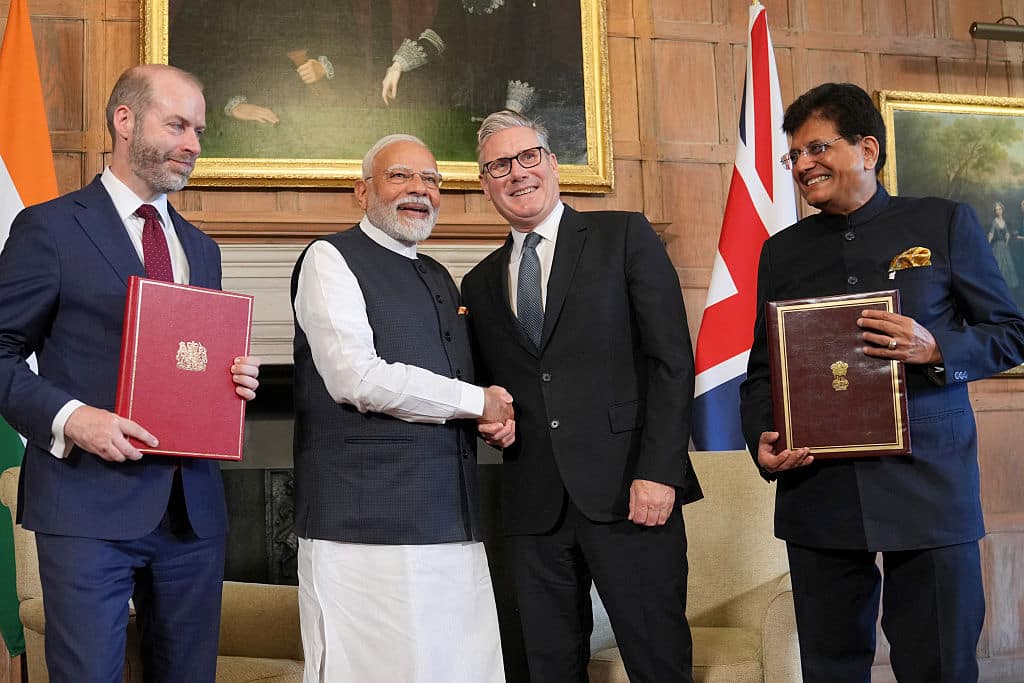India-UK Free Trade Agreement: New Tariff Safeguards and Protection for Domestic Industries

India has recently solidified its economic ties with the United Kingdom by signing a free trade agreement (FTA) that grants the country the authority to impose temporary trade safeguards. This significant development, confirmed by the commerce ministry, allows India to raise import tariffs or suspend duty concessions in response to a sudden influx of British imports that could harm domestic industries. The agreement was finalized in London, with key leaders from both nations, including Prime Minister Narendra Modi and UK Prime Minister Keir Starmer, in attendance.
Details of the Trade Agreement
The newly signed FTA includes provisions for bilateral safeguard measures, enabling India to take protective actions if there is a significant surge in imports from the UK. According to the commerce ministry, these measures can be enacted to prevent or address serious injury to Indian domestic industries. The safeguards are initially valid for a period of two years but can be extended for an additional two years if a formal investigation determines that continued protection is necessary. This means that the maximum duration for these safeguards can reach up to four years.
If India chooses to apply these safeguards for only two years, the UK will not be able to retaliate. However, if the measures are extended to the full four years, the UK will have the right to respond with its own trade measures. This aspect of the agreement highlights the careful balance both countries aim to maintain in their trade relations.
Provisional Safeguards and Sensitive Sectors
The FTA also includes a provision for provisional safeguards that can be implemented in urgent situations. These provisional measures can be enforced for up to 200 days based on preliminary findings, allowing India to act swiftly to prevent irreparable harm to its domestic industries. However, these provisional measures must be followed by a comprehensive investigation to ensure their necessity.
Commerce Minister Piyush Goyal emphasized that the agreement has effectively protected sensitive sectors in India, including dairy, rice, and sugar. He stated that there has been “zero compromise” in these areas during the negotiations, ensuring that these critical sectors remain shielded from potential adverse effects of increased imports from the UK. Goyal described the FTA as a “phenomenal” agreement that offers extensive benefits while safeguarding India’s economic interests.
Impact on Exports and Future Prospects
The trade agreement is expected to significantly boost exports in labor-intensive sectors such as footwear, textiles, and gems and jewelry. By enhancing trade relations with the UK, India aims to create more opportunities for its industries and improve its overall economic landscape. The FTA is seen as a strategic move to strengthen India’s position in the global market while ensuring that domestic industries are not adversely affected by international competition.
As both countries move forward with the implementation of this agreement, the focus will be on monitoring the impacts of the trade measures and ensuring that the benefits of the FTA are realized across various sectors. The successful execution of this agreement could pave the way for further economic collaborations between India and the UK, fostering a mutually beneficial relationship in the years to come.
Observer Voice is the one stop site for National, International news, Sports, Editor’s Choice, Art/culture contents, Quotes and much more. We also cover historical contents. Historical contents includes World History, Indian History, and what happened today. The website also covers Entertainment across the India and World.

